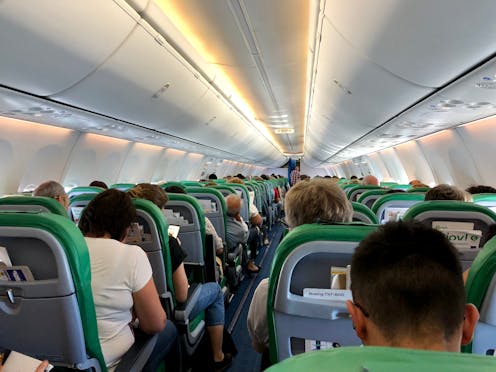Why you might be paying more for your airfare than the person seated next to you
- Written by Rob Nicholls, Senior lecturer in Business Law, UNSW

Price discrimination is legal in Australia where sellers will typically pick an opening price based on the likelihood that someone will pay it. We take a look at how you can get the best deal on airfares in the second part of a series exploring how technology is changing tourism.
Few things are more annoying than spending a large sum of money on a purchase, only to discover that someone else got the same thing for a lower price. This often happens with airfares. You go the same website, search the same airline, choose the same seat row and fare conditions, but you’re offered a different price depending on when and where you do it. Why?
Often it’s a result of price discrimination. This happens when a seller charges you what you’re willing to pay. Of course, it also needs to be at a level that the seller is willing to accept.
When it comes to airfares, there are two levels of price discrimination, both driven by algorithms. First, there is price discrimination by the airline. Airline pricing is typically dynamic. That is, the prices are higher for more popular flights. Then there are intermediary platforms, such as travel agents or price comparison websites, which can introduce a further level of price discrimination.
Read more: Longing for the 'golden age' of air travel? Be careful what you wish for
How it works
Websites create cookies that record interactions between a user and a website. Often there are other tags and beacons created. From these, the website provider can obtain information, such as the browser type and the kind of device being used. Flight sales providers use this information to determine the price offered to a customer.
For example, if the same user checks a website multiple times for a flight at a specific time and on a particular date, the provider might assume this is the only time and date the user is interested in. It might respond by increasing the price offered, since it knows the travel decision is made. Alternatively, it might reduce the price to lock in the customer.
Clearing cookies or using a search engine that does not share search history (such as Duck Duck Go) can reduce this effect.
Price discrimination is legal
In Australia, like in many countries, price discrimination is legal. Sellers will typically pick an opening price based on the likelihood that someone will pay it. You see this happen at garage sales. Indeed, perfect price discrimination may mean that no two people pay the same price for the same product or service.
There are a few different ways of thinking about this.
In one sense, this is just how markets operate. If both buyers and sellers operate in a self-interested manner, efficient outcomes arise that are better for everyone – it’s the “invisible hand”. Of course, this doesn’t prevent people from feeling ripped off.
Read more: Explainer: fuel hedging and its impact on airlines and airfares
The market can also provide intermediaries. Instead of paying the airline’s asking price, you could get an intermediary to buy the fare for you at a lower price. After all, you might not mind paying more than the minimum price available, provided that it’s less than you thought was reasonable to start off with. In airline searches, this is the type of service offered by businesses such as SkyScanner.
Limitations
There is a legal issue which limits the use of price discrimination – such as if a seller engages in actual discrimination. If a website discriminates against an identifiable group, for example by charging more to women with an Italian surname, it would risk being in breach of the Racial Discrimination Act.
Another limitation is the potential for social media backlash against the practice, which could lead to reputational harm. In the retail space, Amazon issued a statement denying that it engages in price discrimination, after angry customers found they had been charged different prices for the same product. Platforms engaged specifically in airline sales haven’t disclosed whether or not they engage in price discrimination, but they are likely at risk of similar customer backlash.
Read more: So when should you book that flight? The truth on airline prices
In the end, if you want to get a better deal on your airfare, the answer is still to shop around. And using comparison services, clearing cookies from you browser cache, and leaving as few breadcrumbs as possible is likely to yield the best deals.
Authors: Rob Nicholls, Senior lecturer in Business Law, UNSW




